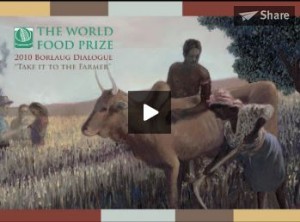 The World Food Prize is the foremost international award recognising the achievements of individuals who have advanced human development by improving the quality, quantity or availability of food in the world. Dr Norman Borlaug, winner of the Nobel Peace Prize in 1970 for his work in world agriculture, envisioned a prize that would honour those who have made significant and measurable contributions to improving the world’s food supply.
The World Food Prize is the foremost international award recognising the achievements of individuals who have advanced human development by improving the quality, quantity or availability of food in the world. Dr Norman Borlaug, winner of the Nobel Peace Prize in 1970 for his work in world agriculture, envisioned a prize that would honour those who have made significant and measurable contributions to improving the world’s food supply.African smallholder farmers are both victims and culprits of climate change. Global warming damages agriculture more than any other sector in developing countries, yet agriculture, forestry and land use change generate 30% of all greenhouse gases. Despite this conflict, and although agriculture does contribute significantly to the accumulation of greenhouse gases, it can also assume a considerable role as a mitigator of climate change. Carbon sequestration, changes in crop genetics, better management of irrigation, fertiliser use and soil, amongst others, offer excellent opportunities for agriculture to counter the damaging effects of climate change.
Although there is greater optimism on the continent, widespread success will not be achieved by Africa alone. There is a need for partnerships between the science and technology communities of the North, and the knowledge and innovation of smallholder farmers in the South. Technology, including the promotion of crop biodiversity, offers considerable assistance in mitigating the issues of climate change, and this is a topic covered in-depth in the presentation. The presentation is scientific in nature, and further understanding of key elements of Sir Gordon Conway’s discussion can be found in a book co-authored between himself and Professor Jeff Waage: ‘Science and Innovation for Development’, which is available as a free download here.






